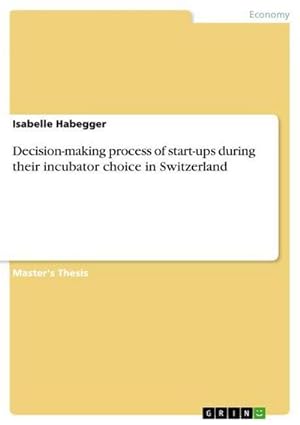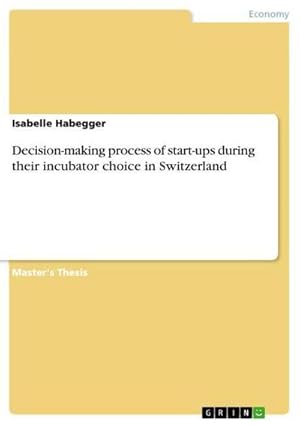isabelle habegger (2 resultados)
Tipo de artículo
- Todo tipo de artículos
- Libros (2)
- Revistas y publicaciones
- Cómics
- Partituras
- Arte, grabados y pósters
- Fotografías
- Mapas
-
Manuscritos y
coleccionismo de papel
Condición
- Todo
- Nuevos
- Antiguos o usados
Encuadernación
- Todo
- Tapa dura
- Tapa blanda
Más atributos
- Primera edición
- Firmado
- Sobrecubierta
- Con imágenes del vendedor
- Sin impresión bajo demanda (1)
Ubicación del vendedor
Valoración de los vendedores
-
Decision-making process of start-ups during their incubator choice in Switzerland
Publicado por GRIN Verlag Sep 2015, 2015
ISBN 10: 3668057052ISBN 13: 9783668057050
Librería: BuchWeltWeit Ludwig Meier e.K., Bergisch Gladbach, Alemania
Libro Impresión bajo demanda
Taschenbuch. Condición: Neu. This item is printed on demand - it takes 3-4 days longer - Neuware -Master's Thesis from the year 2015 in the subject Business economics - Company formation, Business Plans, grade: A, Novancia Business School Paris, language: English, abstract: This following report investigates the decision-making process of Swiss start-ups during their selection of an incubator in Zurich. It explores the ways start-ups decide on an incubator, which allows introducing a model for this matter. Thus, this study is motivated by the following research question: 'What is the decision-making process of start-ups when selecting an incubator in Switzerland' Previous literature failed to address the combination of incubation, start-ups and decision-making. Existing literature has focused predominantly on incubators' performance, success factors of start-ups and decision-making reasons for creating a new venture. In other words, the gap in the literature is that primary research regarding incubator selection by start-ups has not been conducted. Hence, the aim of this research is to fill this gap by identifying the trigger for a start-up's incubator search, the information channels it uses and the criteria for decision-making, which makes it possible to develop a framework for future start-ups, and existing as well as future incubators. The outcomes were based on semi-structured interviews with 10 start-ups in Zurich. Results showed that the trigger for incubator search is office space. Furthermore, the decision-making distinguishes itself between experienced and inexperienced entrepreneurs. Experienced mostly use search engines such as Google whereas inexperienced entrepreneurs obtain information through their close social circles. Criteria for decision-making for experienced entrepreneurs are tangible services such as infrastructure and location whereas for inexperienced entrepreneurs intangible services such as networking and coaching are valuable. The findings allow introducing a model that is usef 192 pp. Englisch.
-
Decision-making process of start-ups during their incubator choice in Switzerland
Publicado por GRIN Verlag, 2015
ISBN 10: 3668057052ISBN 13: 9783668057050
Librería: AHA-BUCH GmbH, Einbeck, Alemania
Libro
Taschenbuch. Condición: Neu. Druck auf Anfrage Neuware - Printed after ordering - Master's Thesis from the year 2015 in the subject Business economics - Company formation, Business Plans, grade: A, Novancia Business School Paris, language: English, abstract: This following report investigates the decision-making process of Swiss start-ups during their selection of an incubator in Zurich. It explores the ways start-ups decide on an incubator, which allows introducing a model for this matter. Thus, this study is motivated by the following research question: 'What is the decision-making process of start-ups when selecting an incubator in Switzerland' Previous literature failed to address the combination of incubation, start-ups and decision-making. Existing literature has focused predominantly on incubators' performance, success factors of start-ups and decision-making reasons for creating a new venture. In other words, the gap in the literature is that primary research regarding incubator selection by start-ups has not been conducted. Hence, the aim of this research is to fill this gap by identifying the trigger for a start-up's incubator search, the information channels it uses and the criteria for decision-making, which makes it possible to develop a framework for future start-ups, and existing as well as future incubators. The outcomes were based on semi-structured interviews with 10 start-ups in Zurich. Results showed that the trigger for incubator search is office space. Furthermore, the decision-making distinguishes itself between experienced and inexperienced entrepreneurs. Experienced mostly use search engines such as Google whereas inexperienced entrepreneurs obtain information through their close social circles. Criteria for decision-making for experienced entrepreneurs are tangible services such as infrastructure and location whereas for inexperienced entrepreneurs intangible services such as networking and coaching are valuable. The findings allow introducing a model that is usef.



